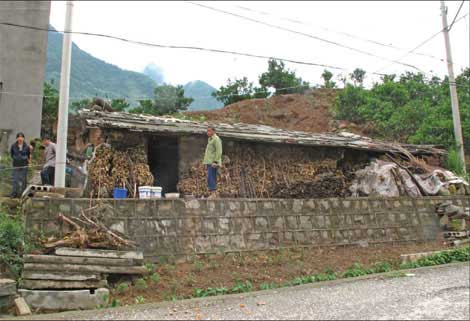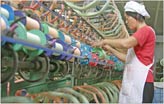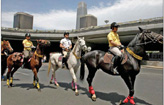Trouble in the gorges
Updated: 2011-06-03 11:11
By Hu Yinan (China Daily European Weekly)
 |
|
Li Yuxiu (second from left) and her husband outside their self-made shanty in Zigui, Hubei province, in late May this year. They had to move out of their crumbling homes and seek shelter in the shanty. Their old house was two meters above the Three Gorges Dam's 175-m storage level. Photos by Hu Yinan / China Daily |
Idea dates to 1918
Debates about the possible impact of the dam on nature and the conditions of those who had lived in its footprint have been intense. But for a river that flooded in almost every decade in the 2,000 years of China's feudal history, most scientists agreed that something had to be done.
First proposed by Dr Sun Yat-sen, who led the first government after the overthrow of the Qing Dynasty (1644-1911), in 1918, the idea of the Three Gorges Dam inspired generations of youths in the following decades. Designing the dam was once a career goal for Ma Ho-ling, father of Taiwan's current leader, Ma Ying-jeou.
The dam was to be jointly designed by Chinese and US experts as part of an agreement in 1946; US dam expert John Lucian Savage had already conducted field research. But the project was halted in May 1947 by the civil war and the dam's planning did not resume until 1955.
Feasibility studies went on for 37 years. The top national legislative body approved the project in 1992. The water level behind the dam reached 135 meters in 2003 and 175 meters in 2009, when the dam became fully operational. It is seen as a solution to China's flood control and energy production problems.
Until June 10, the Three Gorges Dam plans to increase water discharges up to 12,000 cubic meters per second for drought relief downstream.
"The sudden increase of water discharges from the dam will crash the bank, making the shores unstable," says Guan Fengjun, director of the geological environment department under the Ministry of Land and Resources. The risk of landslides rises, too.
Little arable land
Living conditions of the resettled population is a major issue.
Hubei and Chongqing aim to boost per capita GDP to $3,400 (2,358 euros) and $3,300, respectively, by 2020. The numbers fall well short of the national goal, $5,000. The situation is more severe in Zigui, which is classified as a "State-level poor county".
There are no strangers to sacrifice in this county. Zigui's three most famous historic figures are a statesman who drowned himself to protest corruption in the Kingdom of Chu (Qu Yuan, the Dragon Boat Festival character);
a beauty who married an ethnic chieftain in exchange for peace in the Han Empire (Wang Zhaojun), and a Communist whose death inspired the Chinese revolution (Xia Minghan).
Zigui remains underdeveloped, and its people continue to make sacrifices for the dam.
In Guizhou town, the per capita net income was $462 in 2010. At $1.26 a day, this is below the poverty line defined by the United Nations Development Programme ($1.50 a day).
Farmland shortages are at the heart of the problem. Each resettled rural resident here is entitled to 0.05 hectare of arable land, mostly dispersed on fragile hilltops, official statistics show. That is just over half of the national per capita average of 0.092 hectare for the plots that peasants are entitled to farm.
Since 2006, the State has offered monthly subsidies of 50 yuan per farmer for 20 years for those living below the dam's storage level of 175 meters. The money, roughly $7.70 a month, is not enough for three Big Mac meals at McDonald's.
Consequently, many people have left for more profitable jobs in the cities. In Guizhou, 85 percent of adult laborers were working away from home last year.
Dozens of families in Xiangjiadian, a village in Guizhou, complain of insufficient compensation for relocation in 1997 to make way for a road as part of the dam project. Officials paid them 45 yuan per square meter; the land is now worth more than 40 times that. The families lived in shanties they built for five years, until the road was completed and they were allowed to build permanent homes beside it.
"We haven't been able to benefit from the policies that official documents stipulate. This has led to my economic losses," farmer Wu Chengcai, 62, said.
E-paper

Pearl on the Yangtze
Wuxi is considered a town of natural beauty and its motto is "city of water and warmth".
Prose and consternation
Riding on a mystery train
Way of a warrior
Specials

Wealth of difference
Rich coastal areas offer contrasting ways of dealing with country's development

Seal of approval
The dying tradition of seal engraving has now become a UNIVERSITY major

Making perfect horse sense
Riding horses to work may be the clean, green answer to frustrated car owners in traffic-trapped cities
